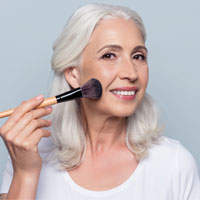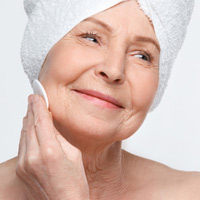Expert Q&A: How to relieve dry, itchy skin

Dry and itchy skin can be a real pain, especially if you aren’t sure of the cause or which remedies are most effective. With so many products available with moisturising properties, it's also difficult to know what's the right solution for you, so we put your questions about the condition to Specialist Dermatology Nurse Paula Oliver. From triggers to treatment, here are her answers to help you with your dry skin problems.
Get more health advice delivered straight to your inbox...
This page is sponsored by:

My husband has developed what looks like psoriasis on his face. It comes and goes and it seems like stress triggers it. Is this a possible reason for it to have started?
"There are several different facial rashes that we see in dermatology. Psoriasis is certainly a common condition, affecting one in 50 people, and it can appear on the face and other areas of the body. It can appear at any age, it’s not infectious and it doesn’t cause scarring. We do know that psoriasis, particularly if moderate to severe, can cause stress, anxiety and sometimes depression in some cases. But things like stress, smoking, alcohol, some medications and trauma can also trigger it too. It may be worth seeking advice from your local pharmacist or GP as we do see a type of eczema on the face called seborrheic dermatitis that can look very similar."
How many times a day do I need to be moisturising my body? I suffer from dry, itchy, flaky skin - especially the tops of my arms, which can become bumpy as well.
"The amount of times you need to moisturise your skin and the correct application is a very individual thing. It sounds like your skin is quite dry, so think about the type of moisturiser you use. A cream is sometimes helpful in the morning as it’s less greasy so more cosmetically acceptable, but perhaps at bedtime you could use something like a moisturising gel or ointment which are more oil-based and greasy. We often advise someone who, for example, has eczema or psoriasis to apply their moisturiser up to four times a day, but we do appreciate that the routine of moisturising has to fit into your lifestyle. You mentioned you have bumpy areas on the tops of your arms. This may be something called Keratosis Pilaris which is a completely harmless skin condition and affects approximately 40% of adults. It looks like ‘goose bumps’ and feels slightly rough. Often using a urea-based moisturiser can help this."

Can you develop eczema in later life? What do you suggest for areas which are very dry but with surrounding areas that need a different cream?
"The answer to your question is yes, you can develop eczema later in life. I have seen patients in their 90s presenting for the first time to the dermatology clinic with a type of eczema. As we get older our skin undergoes a number of changes, and it's estimated that 70% of elderly patients have skin problems. There are external factors that contribute to dry skin such as excessive sunlight, smoking and irritants such as soaps and bubble baths. Extremes of temperature in the weather, central heating, and sometimes medications can cause our skin to dry. I think it’s a good habit in the first instance to moisturise the whole of your skin at least twice daily and then you can apply any other prescribed ointment or cream, such as steroids cream, directly to the affected area."
I have manageable dry skin that just needs a bit of moisturiser and I need to keep an eye on products I use in the shower. Does the amount I drink have any effect on the dryness?
"I think it's always important to drink the recommended amount of fluid on a daily basis (approximately two litres per day) which helps to keep us healthy and hydrated. It is, however, worth remembering that dehydrated skin lacks water, whilst dry skin lacks oils and natural moisturising factors. Natural moisturising factors (NMF) are elements that keep the outer layer of the skin protected and well-hydrated. Our skin often needs help with added hydration via moisturisers to protect the skin from further moisture loss. You quite correctly say that you find that you need to watch what you shower with; if we use products that are highly perfumed or ones that contain detergents this can strip the natural lipids (fats) from our skin."
I suffer from psoriasis. What's my best option?
"I think to start with it's worth reading and researching the most up-to-date information regarding psoriasis, how it's currently managed, how we can help ourselves in areas such as moisturising our skin, and avoiding potential triggers for psoriasis. Over the past 20 years we have learnt so much more about psoriasis and, although we have no cure as such, there are many more treatments available to us in the UK. The British Association of Dermatologists (BAD) have an up-to-date patient information leaflet on their website which provides a great overview about psoriasis and what you can do to help."
An itchy scalp is my problem - it doesn’t matter which shampoo I use. I understand it’s quite common as you age. Is there a cream to rub into the skin which doesn’t leave the hair looking greasy?
"Scalp pruritis, known as itchy scalp, is a common condition but miserable for the sufferer. Dandruff and seborrheic dermatitis are the most common causes. It sounds like you have tried most shampoos but have you tried any medicated products that either contain coal tar, salicylic acid, climbazole or ketoconazole? These products help to descale the scalp and may in turn soothe the itch. Perhaps one evening a week it may be worth using a greasy moisturiser and massaging it into the scalp. After this apply a shower cap, leave it on for a couple of hours, and then shampoo it off with a medicated shampoo. It’s a little messy but may be worth a try when you have a quiet evening to see if it improves the itch."
Join a community of over 300,000 users on Gransnet today

Should all skin cream contain a 30+ SPF or even 50+ nowadays?
"I think in terms of sun protection, creams, sprays and lotions etc., it's worth using a higher SPF as you mention, above 30+ ideally. I use a SPF 50+ on my face everyday all year round, but I am fair skinned so more at risk of developing sun damaged skin. Many moisturisers and foundations contain a SPF of 15, and for many people they would still need regular applications of sunscreen. I guess if all cosmetic creams contained a high SPF of 30+ it may discourage people from applying their sunscreen on a regular basis. It’s an interesting thought though."
I have dry skin and eczema on my elbows and the backs of my knees, and most of the time I tolerate it. It does flare up and spread from time-to-time on my neck and hands. I have always used a non-bio detergent, but one thing I have never done is a food intolerance test. Is it worth doing one to see if any food groups contribute towards my condition?
"In the UK, one in 12 adults have eczema, which is a dry skin condition that presents with red, scaly and itchy skin. If you have eczema your skin may not produce as much fat and oils as other people and will be less able to retain water. The protective barrier is therefore not as good as it should be. Gaps open up between the cells because they are not sufficiently plumped up with water. We know that the key is to keep the skin well moisturised. This can make a big difference in preventing flare ups of eczema. For most people with eczema, food allergy or intolerance is not a factor that influences the condition of their skin, so it's not something that we routinely suggest. However it may be worth visiting the National Eczema Society website to seek further information on the subject area."

Both my 70 year old husband and my daughter are currently suffering from dry flakiness in the creases of their eyelids, which is sore, but neither will go to the doctor. What do you recommend and what is safe for this sensitive area?
"You are quite correct, we need to be careful what we apply to this very sensitive area. In fact, the skin is at its thinnest at this site. The eyelid is unique as the skin is thinner and it lacks the fat which protects the rest of the body’s skin. As a result, our eyelids are more susceptible to irritants and skin conditions. You mentioned that your husband and daughter are not keen to visit the GP. Don’t forget the great service that your local pharmacist can offer - they are able to suggest treatment options as well. I would say firstly that your husband and daughter should avoid using any soap products to wash the skin. You can purchase over the counter a soap substitute to wash with and then the same product can also act as a moisturiser after washing."
Are there any foods that are good to eat or even help with dry itchy skin?
"I think the overall general message here is that we would always recommend a healthy diet with plenty of fruit and vegetables and to ensure a good fluid intake of at least two litres a day. We do know that fish like salmon, containing omega-3 fatty acids, can reduce inflammation and help to keep the skin moisturised. In general, a good, varied diet is the best way forward."
Whilst I do not have any diagnosed skin issues, I have found patches of dry skin on my legs and arms increasing with age. Is it to be expected and should I be concerned?
"It may be that simply regularly moisturising could help. As we age, we produce less grease in the skin so increasing the amount of time we moisturise the skin for is important. We sometimes also see dry patches on arms and legs that are due to an accumulation of ultraviolet light over the years. My advice would be to see your GP to ask them to examine the skin so you know you have the correct plan of action."
92% of gransnetters would recommend the Gransnet Rated Balneum Dry Skin and Itch Relief Lotion. Find out more and buy yours here. You can also buy Balneum's cream here.
References used in Paula's answers: British Association of Dermatologists and the National Eczema Society.
UK-BAC-2000003 May 2020
Disclaimer: This page was created before the CoronaVirus pandemic, therefore we would urge you to follow Government advice about visiting GP/pharmacy only for essentials at this time.

Images: Shutterstock








